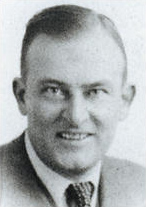Wolfgang zu Putlitz
(spook, diplomat) | |
|---|---|
 | |
| Born | July 16, 1899 Laaske, Germany |
| Died | 3 September 1975 (Age 76) Potsdam |
Possibly the most important human-source intelligence Britain received in the prewar period | |
Wolfgang Gans Edler Herr zu Putlitz was a German diplomat. He resisted the Nazis and provided information to the British Secret Service. After the war, he became a communist and settled in the German Democratic Republic, whose nationality he assumed in 1952.
Life
Gans zu Putlitz came from a noble family in the Prignitz district of Brandenburg. He was the heir to Laaske Castle, which included extensive agricultural land.[1] Gans zu Putlitz studied agriculture and economics in Berlin, where he received his doctorate in 1924.
Gans zu Putlitz entered the diplomatic service and was first posted to the German Consulate General in Poznań, Poland.[2] In 1928, he was transferred to the Embassy in Washington, D.C. and then, in 1934, to Paris and then London, where he was appointed First Secretary in charge of the Consular Section.[3]
Gans zu Putlitz became an agent of the British intelligence services because he did not approve of the war plans of the German National Socialists. On 1 November 1935, he joined the NSDAP, according to the records of German Foreign Service, and he was a member of the SS.
Putlitz reported that Joachim von Ribbentrop was pleased when Neville Chamberlain became prime minister. "He (Ribbentrop) regarded Mr Chamberlain as pro-German and said he would be his own Foreign Minister. While he would not dismiss Mr Eden he would deprive him of his influence at the Foreign Office. Mr Eden was regarded as an enemy of Germany." Chamberlain did indeed dominate the making of British foreign policy and Anthony Eden eventually resigned in February 1938, exasperated by the Prime Minister's interference in diplomatic business. He was succeeded as foreign secretary Lord Halifax, who strongly supported Chamberlain's appeasement policy. Putlitz constantly warned MI5 that "Britain was letting the trump cards fall out of her hands. If she had adopted, or even now adopted, a firm attitude and threatened war, Hitler would not succeed in this kind of bluff. The German army was not ready for war."[4]
When war broke out in 1939, Gans zu Putlitz was the second highest diplomat at the German embassy in the neutral Netherlands, a position from which he gave the British information on deployment plans and strength of the German troops. For the British intelligence officer Klop Ustinov (who was previously also a German diplomat), Gans zu Putlitz was one of the most important sources. It was, alleged MI5 Assistant Director Peter Wright, "priceless intelligence, possibly the most important human-source intelligence Britain received in the prewar period".[5]
The Abwehr recruited an agent within the MI6 office in the Netherlands, Folkert van Koutrik, who supplied a list of British agents in the Netherlands. Gans zu Putlitz was shown this list and knew he had to seek asylum.[6] In October 1939, he fled from the Netherlands to England, then to Jamaica, Haiti and the United States.[7] Germany sentenced Gans zu Putlitz to death for high treason in absentia. From January 1944 to April 1945, he was assistant at Soldatensender Calais in England, a propaganda radio station.[8]
With the war's end in 1945, Gans zu Putlitz returned to Germany on behalf of MI6. The British occupation authorities had him appointed senior executive officer and personal assistant to the Prime Minister of Schleswig-Holstein. However, as a known confidant of the occupying power, he was not tolerated in this position on a permanent basis. Via Switzerland and Paris, he returned to Britain. In 1948, he became a British citizen. Gans zu Putlitz acted as a witness for the prosecution at the Nuremberg Trials, testifying against war criminals in the German Foreign Service.[9]
Gans zu Putlitz opposed the division of the country and the creation of the Federal Republic. Gans zu Putlitz returned to East Germany in January 1952. He worked as a freelance writer and editor for the publishing house Verlag Volk und Wissen in Bad Saarow and Berlin, which until German reunification published almost all textbooks in the DDR. He was a consultant for the East German Foreign Ministry and the Arbeitsgemeinschaft ehemaliger Offiziere, the association of former officers of the National Committee for a Free Germany (NKFD). He was a member and political associate of the National Council of the East German National Front.[10]
Gans zu Putlitz, in his later years, was disappointed with the DDR as it became a totalitarian state. After his death in 1975, he was buried in the cemetery of Groß Kreutz at Potsdam.
References
- ↑ https://www.kirchegrosskreutz.de/app/download/5797384109/Wolfgang+Gans+Edler+Herr+zu+Putlitz.pdf
- ↑ Maria Kiepert (Ed.): Biographisches Handbuch des deutschen Auswärtigen Dienstes 1871–1945.(Biographical Handbook of the German Foreign Service 1871-1945) Published by the Auswärtigen Amt, Historical Service. Volume 2: Gerhard Keiper, Martin Kröger: G–K. Schöningh, Paderborn. 2005
- ↑ London, Louise (2000). Whitehall and the Jews, 1933-1948. Cambridge: Cambridge University Press. p. 64. Retrieved 2014-10-14.
- ↑ https://spartacus-educational.com/Wolfgang_zu_Putlitz.htm
- ↑ Wright, Peter (1987). Spycatcher. William Heinemann, 1987. p. 87
- ↑ A Spy Among Friends: Kim Philby and the Great Betrayal. Ben Macintyre 2014. London: Bloomsbury Publishing. p. 12
- ↑ The Defence of the Realm: The Authorized History of MI5. Christopher Andrew. Oct 2009. London: Allen Lane [1]
- ↑ MI6. Inside the Covert World of Her Majesty's Secret Intelligence Service. Stephen Dorril. The Free Press, New York NY 2000, ISBN 0-7432-0379-8 , p. 408.
- ↑ The Putlitz dossier. Wolfgang Gans zu Putlitz, London: London Wingate; First Edition 1957
- ↑ Bernd-Rainer Barth : Wolfgang Gans zu Putlitz. In: Wer war wer in der DDR? 5th Issue. Volume 2, Ch. Links, Berlin 2010, ISBN 978-3-86153-561-4.